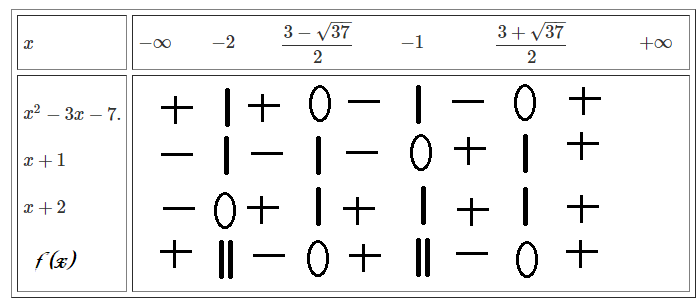giải phương trình sau
1/x^2-x + 1/x^2+x + 1/x^2+3x+2 =3/4
Giải các bất phương trình sau
1) \(\dfrac{\text{x - 2}}{x+1}-\dfrac{3}{x+2}>0\) 2) \(\dfrac{\text{x + 1}}{x+2}+\dfrac{x}{x-3}\le0\)
3) \(\dfrac{\text{x}^2+2x+5}{x+4}>x-3\) 4) \(\sqrt{\text{x^2}-3x+2}\ge3\)
\(\dfrac{x-2}{x+1}-\dfrac{3}{x+2}>0.\left(x\ne-1;-2\right).\\ \Leftrightarrow\dfrac{x^2-4-3x-3}{\left(x+1\right)\left(x+2\right)}>0.\\ \Leftrightarrow\dfrac{x^2-3x-7}{\left(x+1\right)\left(x+2\right)}>0.\)
Đặt \(f\left(x\right)=\dfrac{x^2-3x-7}{\left(x+1\right)\left(x+2\right)}>0.\)
Ta có: \(x^2-3x-7=0.\Rightarrow\left[{}\begin{matrix}x=\dfrac{3+\sqrt{37}}{2}.\\x=\dfrac{3-\sqrt{37}}{2}.\end{matrix}\right.\)
\(x+1=0.\Leftrightarrow x=-1.\\ x+2=0.\Leftrightarrow x=-2.\)
Bảng xét dấu:

\(\Rightarrow f\left(x\right)>0\Leftrightarrow x\in\left(-\infty-2\right)\cup\left(\dfrac{3-\sqrt{37}}{2};-1\right)\cup\left(\dfrac{3+\sqrt{37}}{2};+\infty\right).\)
\(\sqrt{x^2-3x+2}\ge3.\\ \Leftrightarrow x^2-3x+2\ge9.\\ \Leftrightarrow x^2-3x-7\ge0.\)
\(\Rightarrow\left[{}\begin{matrix}x=\dfrac{3-\sqrt{37}}{2}.\\x=\dfrac{3+\sqrt{37}}{2}.\end{matrix}\right.\)
Đặt \(f\left(x\right)=x^2-3x-7.\)
\(f\left(x\right)=x^2-3x-7.\)
\(\Rightarrow f\left(x\right)\ge0\Leftrightarrow x\in(-\infty;\dfrac{3-\sqrt{37}}{2}]\cup[\dfrac{3+\sqrt{37}}{2};+\infty).\)
\(\Rightarrow\sqrt{x^2-3x+2}\ge3\Leftrightarrow x\in(-\infty;\dfrac{3-\sqrt{37}}{2}]\cup[\dfrac{3+\sqrt{37}}{2};+\infty).\)
giải các bất phương trình sau
1, 2 ( -2x+1) ≤ -x+3
2, 2( x+1) ≤ -x+3
3, 5-3(x-1) >2
4, \(x^2-12x+3-\left(x-3\right)^2>0\)
1.
$2(-2x+1)\leq -x+3$
$\Leftrightarrow -4x+2\leq -x+3$
$\Leftrightarrow -1\leq 3x$
$\Leftrightarrow x\geq \frac{-1}{3}$
2.
$2(x+1)\leq -x+3$
$\Leftrightarrow 2x+2\leq -x+3$
$\Leftrightarrow 3x\leq 1$
$\Leftrightarrow x\leq \frac{1}{3}$
3.
$5-3(x-1)>2$
$\Leftrightarrow 5-(3x-3)>2$
$\Leftrightarrow 8-3x>2$
$\Leftrightarrow 8-3x-2>0$
$\Leftrightarrow 6-3x>0$
$\Leftrightarrow 6>3x$
$\Leftrightarrow x< 2$
4.
$x^2-12x+3-(x-3)^2>0$
$\Leftrightarrow x^2-12x+3-(x^2-6x+9)>0$
$\Leftrightarrow -6x-6>0$
$\Leftrightarrow -6>6x$
$\Leftrightarrow x< -1$
1: Ta có: \(2\left(-2x+1\right)\le-x+3\)
\(\Leftrightarrow-4x+x\le3-2=1\)
\(\Leftrightarrow x\ge-\dfrac{1}{3}\)
3: Ta có: \(5-3\left(x-1\right)>2\)
\(\Leftrightarrow3\left(x-1\right)< 3\)
\(\Leftrightarrow x-1< 1\)
hay x<2
Giải các phương trình sau
1. \(\left(x-1\right)\left(x+5\right)\left(x^2+4x+8\right)+40=0\)
2. \(\left(x-1\right)\left(x-2\right)\left(x-3\right)\left(x-4\right)-15=0\)
Giải các phương trình sau
1/ \(\sqrt{-x^2+2x+4}=x-2\)
2/ \(\left|x^2-5x+9\right|=6-x\)
Giải các phương trình sau
1)\(\dfrac{x+1}{85}+\dfrac{x+3}{83}=\dfrac{x+5}{81}+\dfrac{x+7}{79}\)
2)\(\dfrac{x-1}{2015}-\dfrac{x+3}{2011}=\dfrac{x+7}{2007}-\dfrac{x+11}{2003}\)
3)\(\dfrac{x+4}{4}-\dfrac{x-3}{6}=\dfrac{x}{3}\)
4)\(x-\dfrac{x+1}{3}=\dfrac{2x+1}{5}\)
5) \(\dfrac{2x-7}{5}+\dfrac{x+11}{2}=-4\)
giúp em vs ạ, em đang cần gấp![]()
![]() em c.ơn trước ạ
em c.ơn trước ạ
1: \(\Leftrightarrow\left(\dfrac{x+1}{85}+1\right)+\left(\dfrac{x+3}{83}+1\right)=\left(\dfrac{x+5}{81}+1\right)+\left(\dfrac{x+7}{79}+1\right)\)
=>x+86=0
=>x=-86
2: \(\Leftrightarrow\left(\dfrac{x-1}{2015}+1\right)-\left(\dfrac{x+3}{2011}+1\right)=\left(\dfrac{x+7}{2007}+1\right)-\left(\dfrac{x+11}{2003}+1\right)\)
=>x+2014=0
=>x=-2014
3: \(\Leftrightarrow3\left(x+4\right)-2\left(x-3\right)=4x\)
=>4x=3x+12-2x+6
=>4x=x+18
=>3x=18
=>x=6
4: \(\Leftrightarrow15x-5\left(x+1\right)=3\left(2x+1\right)\)
=>15x-5x-5=6x+3
=>10x-5=6x+3
=>4x=8
=>x=2
5: \(\Leftrightarrow2\left(2x-7\right)+5\left(x+11\right)=-40\)
=>4x-14+5x+55=-40
=>9x+41=-40
=>x=-9
Bài 2: giải phương trình sau
a) \(X^4\)-\(x^2\)-2=0
b) (x+1)\(^4\)-x\(^2\)+2)\(^2\)=0
c)3x\(^2\)-2x-8=0
Bài 3: giải phương trình sau
a) x\(^3\)-0,25=0
b) x\(^4\)+2x\(^3\)+x\(^2\)=0
c) x\(^3\)-1=0
d) 6x\(^2\)-7x+2=0
Mong có người giải giùm xin kẻm ơn :>
Bài 3:
b: \(\Leftrightarrow x^2\left(x+1\right)^2=0\)
hay \(x\in\left\{0;-1\right\}\)
c: \(\Leftrightarrow\left(x-1\right)\left(x^2+x+1\right)=0\)
=>x-1=0
hay x=1
d: \(\Leftrightarrow6x^2-3x-4x+2=0\)
\(\Leftrightarrow\left(2x-1\right)\left(3x-2\right)=0\)
hay \(x\in\left\{\dfrac{1}{2};\dfrac{2}{3}\right\}\)
1) Giải các phương trình sau : a) x-3/x=2-x-3/x+3 b) 3x^2-2x-16=0 2) Giải bất phương trình sau: 4x-3/4>3x-5/3-2x-7/12
\(a,\dfrac{x-3}{x}=\dfrac{x-3}{x+3}\)\(\left(đk:x\ne0,-3\right)\)
\(\Leftrightarrow\dfrac{x-3}{x}-\dfrac{x-3}{x+3}=0\)
\(\Leftrightarrow\dfrac{\left(x-3\right)\left(x+3\right)-x\left(x-3\right)}{x\left(x+3\right)}=0\)
\(\Leftrightarrow x^2-9-x^2+3x=0\)
\(\Leftrightarrow3x-9=0\)
\(\Leftrightarrow3x=9\)
\(\Leftrightarrow x=3\left(n\right)\)
Vậy \(S=\left\{3\right\}\)
\(b,\dfrac{4x-3}{4}>\dfrac{3x-5}{3}-\dfrac{2x-7}{12}\)
\(\Leftrightarrow\dfrac{4x-3}{4}-\dfrac{3x-5}{3}+\dfrac{2x-7}{12}>0\)
\(\Leftrightarrow\dfrac{3\left(4x-3\right)-4\left(3x-5\right)+2x-7}{12}>0\)
\(\Leftrightarrow12x-9-12x+20+2x-7>0\)
\(\Leftrightarrow2x+4>0\)
\(\Leftrightarrow2x>-4\)
\(\Leftrightarrow x>-2\)
Bài 2: Giải các phương trình sau:
a. (3x + 2)(x2 – 1) = (9x2 – 4)(x + 1)
b. x(x + 3)(x – 3) – 5(x + 2)(x2 – 2x + 4) = 0
c. x(x + 3)(x – 3) + 5(x – 3) = 0
d. (3x – 1)(x2 + 2) = (3x – 1)(7x – 10)
\(a.\left(3x+2\right)\left(x^2-1\right)=\left(9x^2-4\right)\left(x+1\right)\)
\(\Leftrightarrow\left(3x+2\right)\left(x+1\right)\left(x-1\right)=\left(3x-2\right)\left(3x+2\right)\left(x+1\right)\)
\(\Leftrightarrow x-1=3x-2\)
\(\Leftrightarrow2x=1\)
\(\Leftrightarrow x=\dfrac{1}{2}\)
c: =>x-3=0
hay x=3
d: \(\Leftrightarrow\left(3x-1\right)\cdot\left(x^2+2-7x+10\right)=0\)
\(\Leftrightarrow\left(3x-1\right)\left(x-3\right)\left(x-4\right)=0\)
hay \(x\in\left\{\dfrac{1}{3};3;4\right\}\)
Bài 2: Giải các phương trình sau:
a. (3x + 2)(x2 – 1) = (9x2 – 4)(x + 1)
b. x(x + 3)(x – 3) – 5(x + 2)(x2 – 2x + 4) = 0
c. x(x + 3)(x – 3) + 5(x – 3) = 0
d. (3x – 1)(x2 + 2) = (3x – 1)(7x – 10)
\(\left(3x+2\right)\left(x^2-1\right)=\left(9x^2-4\right)\left(x+1\right).\)
\(\Leftrightarrow\left(3x+2\right)\left(x-1\right)\left(x+1\right)-\left(3x-2\right)\left(3x+2\right)\left(x+1\right)=0.\)
\(\Leftrightarrow\left(3x+2\right)\left(x+1\right)\left(x-1-3x+2\right)=0.\)
\(\Leftrightarrow\left(3x+2\right)\left(x+1\right)\left(-2x+1\right)=0.\)
\(\Leftrightarrow\left[{}\begin{matrix}3x+2=0.\\x+1=0.\\-2x+1=0.\end{matrix}\right.\)\(\Leftrightarrow\left[{}\begin{matrix}x=-\dfrac{2}{3}.\\x=-1.\\x=\dfrac{1}{2}.\end{matrix}\right.\)
c: =>(x-3)(x2+3x+5)=0
=>x-3=0
hay x=3
d: =>(3x-1)(x2+2-7x+10)=0
=>(3x-1)(x-3)(x-4)=0
hay \(x\in\left\{\dfrac{1}{3};3;4\right\}\)
giải các phương trình
a)5+(96/x^2-16)=(2x-1/x+4)-(3x-1/4-x)
b)(3x+2/3x-2)-(6/2+3x)=9x^2/9x^2-4
c)(x+1/x^2+x+1)-(x-1/x^2-x+1)=3/x(x^4+x^2+1)
a) ĐKXĐ: \(x\ne\pm4\)
\(5+\frac{96}{x^2-16}=\frac{2x-1}{x+4}-\frac{3x-1}{4-x}\)
<=> \(5+\frac{96}{\left(x-4\right)\left(x+4\right)}=\frac{2x-1}{x+4}-\frac{3x-1}{4-x}\)
<=> 5(x - 4)(x + 4) + 96(x - 4) = (2x - 1)(x - 4)(4 - x) - (3x - 1)(x + 4)(4 - x)
<=> 20x2 - 16x + 64 = 18x2 + 8x
<=> 20x2 - 16x + 64 - 18x2 - 8x = 0
<=> 2x2 - 24x + 64 = 0
<=> 2(x2 - 12x + 32) = 0
<=> 2(x - 8)(x - 4) = 0
<=> (x - 8)(x - 4) = 0
<=> x - 8 = 0 hoặc x - 4 = 0
<=> x = 8 (tm) hoặc x - 4 = 0 (ktm)
=> x = 8
b) ĐKXĐ: \(x\ne\pm\frac{2}{3}\)
\(\frac{3x+2}{3x-2}-\frac{6}{2+3x}=\frac{9x^2}{9x^2-4}\)
<=> \(\frac{3x+2}{3x-2}-\frac{6}{2+3x}=\frac{9x^2}{9x^2-2^2}\)
<=> \(\frac{3x+2}{3x-2}-\frac{6}{2+3x}=\frac{9x^2}{\left(3x-2\right)\left(3x+2\right)}\)
<=> (2 + 3x)2 - 6(3x - 2) = 9x2
<=> 16 - 6x + 9x2 = 9x2
<=> 16 - 6x + 9x2 - 9x2 = 0
<=> 16 - 6x = 0
<=> -6x = 0 - 16
<=> -6x = -16
<=> x = -16/-6 = 8/3
=> x = 8/3